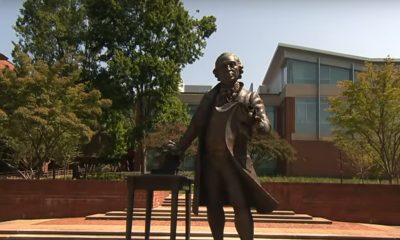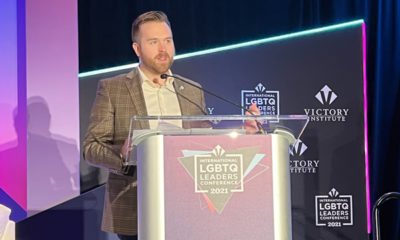Local
Catholic University LGBTQ student group remains unrecognized
CUAllies formed in 2009
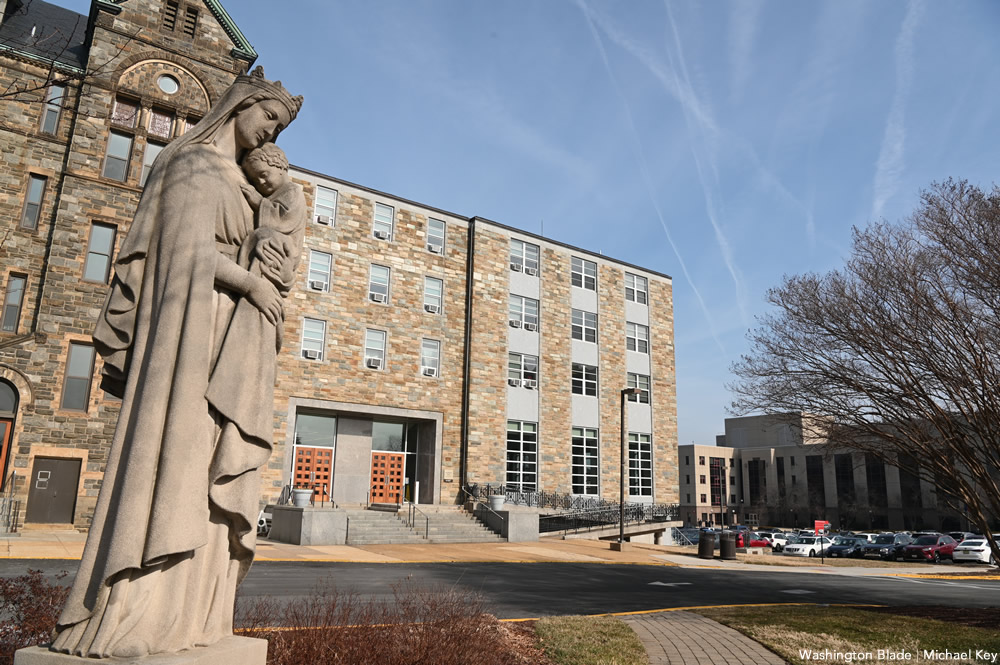
The only on-campus queer student organization at the Catholic University of America, CUAllies, is still fighting for official recognition.
Despite operating “underground,” the club’s roughly 10 members meet regularly to talk about issues facing LGBTQ college students, to create friendships and to connect LGBTQ students and allies with one another. Since the formation of CUAllies in 2009, the administration at Catholic University, most notably President John Garvey, has denied the club official recognition multiple times.
“Just the act of having the university recognize us would be a huge step because it would make people feel way more welcome,” said CUAllies President Ash Samuels. “The nature of having a club that operates under the radar makes you feel like they have to operate under the radar and so just being recognized would make people feel a lot more welcome.”
Additionally, without recognition CUAllies does not have access to the same resources as official student organizations. For example, they cannot rent rooms on campus for meetings, receive funding for events, and are prohibited from advertising club meetings or events on fliers on campus. According to Samuels, the club uses space at the Center for Cultural Engagement, where Director Javier Bustamante allows the club to meet and advertise events.
According to Samuels, CUAllies has been advised by the Dean’s Office to wait until next year to reapply when a new university president will replace Garvey. Until then, Samuels said the group still plans to hold meetings in-person, and he hopes to bring in speakers to talk to members about mental health and issues facing LGBTQ college students.
The last attempt by CUAllies to gain recognition was in March 2021, when the Catholic University’s Student Government Association passed a resolution after hours of public comment from students to support a resolution for the club to request official status. The request, however, was denied by Garvey.
“It was an interesting SGA meeting,” said Samuels. “A lot of people came to public comment and spoke their minds. There was a lot of homophobia.”
Catholic University is one of the 180 campuses deemed unsafe for LGBTQ youth on Campus Pride’s “Worst List.” Campus Pride, an organization that advocates for safe and inclusive college campuses for LGBTQ students, stated on their website that “Catholic University of America has qualified for the Worst Life because it has an extensive and well-documented history of anti-LGBTQ discrimination.”
In addition to repeatedly depriving LGBTQ students of the right to have an official student club, the university has also displayed its homophobic ideology by filing an amicus brief in the 2019 U.S. Supreme Court case Bostock v. Clayton County. In the brief, the university argued that the campuses should be allowed to discriminate based on sexual orientation or gender identity under the Civil Rights Act of 1964.
“This campus has repeatedly proven that they do not support LGBTQ rights, LGBTQ equality,” said Campus Pride Executive Director Shane Windmeyer.
A 2021 survey by the Religious Exemption Accountability Project, an organization that promotes equity for LGBTQ college students at Christian colleges, said that students at Christian colleges are 15 times more likely to report that their gender or sexual identity has prevented them from being accepted by others on campus compared to LGBTQ students at non-Christian colleges.
The pandemic has increased this sense of isolation, as students were forced to attend classes online and did not have access to the same social networks that were once offered in person on many campuses. Although mental health struggles have increased overall for college students overall throughout the pandemic, research has shown that LGBTQ individuals were more likely to have struggled with depression, anxiety, or suicidal thoughts than people identifying as straight.
Attending a university that already has limited resources for its LGBTQ student population, combined with the isolating effects of the pandemic, makes the Catholic University increasingly worrisome for LGBTQ students from a mental health perspective.
“It is a pretty awful environment from the standpoint of mental health if your campus did not have inclusion or had limited inclusion for LGBTQ policies, programs, or practices before the pandemic, the pandemic has only worsened that because of the isolation that these students feel,” said Windmeyer.
Samuels said that CUAllies has served as an important place for students at the Catholic University to meet other queer students, with many members making their first contact with other LGBTQ students through the club. However, Samuels said that operating remotely during the pandemic made it difficult to feel the same level of connection, despite the fact that the group was still meeting routinely over Zoom.
“The feeling of isolation is amplified for LGBTQ students, especially on this campus,” said Samuels. “You might not have friends who you are out to or you might not have friends at all. If you don’t have [club meetings] in person in order to make those connections, and you are already isolated, it makes it a lot harder.”
Despite not having an officially recognized LGBTQ student organization, the Catholic University offers groups orientated towards LGBTQ students through its Counseling Center and Campus Ministry.
The Counseling Center runs a weekly therapy group called MOSAIC, which “provides an environment where LGBT-identified and straight students can come together to learn about available resources, discuss various topics related to personal wellness, and build a supportive network with other students,” according to the Counseling Center’s webpage.
Samuels, who is an active participant in MOSAIC, said that both the therapy group and the Counseling Center are “very LGBTQ+ friendly.” Samuels said he routinely encourages members of CUAllies to get connected with the Counseling Center during club meetings.
According to Samuels, therapists at the Counseling Center have told him that they often get students who identify as LGBTQ, but are hesitant to join CUAllies because they are perceived as being “too liberal or not Catholic enough” despite the organization not having any political or religious affiliation and being welcoming to people of all backgrounds.
Additionally, Catholic University’s Campus Ministry offers a faith group called ‘Beyond the Labels’ which defines itself as a ministry for LGBTQ students “to support each other in their Catholic Christian life by forming holistic friendships,” according to Campus Ministry’s website.
The group was formed last fall by Father Jude DeAngelo, director of Campus Ministry.
“Because we are a Catholic school I think there is a population of students who are trying to integrate their faith with all the different labels that they have either chosen or that people put on them,” said DeAngelo to the Washington Blade. “I just want to have a place where students can come and they can be themselves and they can talk about their faith and their struggles to be Catholic Christians.”
On “Beyond the Labels,” Samuels said, “I think [DeAngelo] has the right intentions, but it still has that risk that people could turn it into a negative thing or misconstrued his words.”
Samuels said that leadership at CUAllies has expressed their concerns to the Counseling Center that “Beyond the Labels” could be potentially harmful towards LGBTQ students. Samuels said that he encourages people who are in need to seek out the Counseling Center first.
DeAngelo did not offer a comment to the Blade on whether he believed CUAllies should be officially recognized by the university, however, according to Samuels, DeAngelo has been an advocate for CUAllies to be officially recognized by the university.
Windmeyer said what the Catholic University has done with its ministry has been replicated at other campuses with harmful policies against LGBTQ students as a push to better their public image.
He said that these colleges try to, “create a narrative that shows that [they] are compassionate, that [they] recognize, underneath our ministry, our LGBTQ group, but [they] are not going to recognize them as student organizations, they have to do it through the ministry. That in itself is just telling me that they are just doing enough to pacify their students, they do not see Catholicism as giving LGBTQ people the human dignity and worth that they deserve.”
Windmeyer noted that other Catholic Universities, such as the University of Notre Dame — which has an official LGBTQ student organization — have made improvements throughout the years to be more inclusive of their LGBTQ student population.
The Catholic Church’s stance on LGBTQ-related issues has improved as well. Last year Pope Francis stated that he endorsed civil unions. However, despite these advancements, activists in conversation with the Blade have remarked church teachings on homosexuality and gender identity remain largely unchanged.
Samuels said that he hopes that the LGBTQ faith group run by DeAngelo will be a step to help the university advocate for CUAllies to become recognized. DeAngelo expressed that he is interested in getting more members of CUAllies involved with “Beyond the Labels,” specifically, he said wants to create joint day-retreat programs with the club.
In the past, “Beyond the Labels” partnered with CUAllies on a day retreat focused on forgiveness. Samuels, who was not a member of CUAllies during the forgiveness retreat, said that he would be more interested in partnering on a team-building retreat instead of focusing on forgiveness because many of CUAllies members are not Catholic.
“I am hopeful that it will lead him to be a larger advocate for us to be a club in the future, but I do also worry that they will just say ‘oh look we already have this program we don’t need you guys,’” said Samuels.
Catholic University did not return the Blade’s request for comment for this story.
District of Columbia
Imperial Court of Washington drag group has ‘dissolved’
Board president cites declining support since pandemic
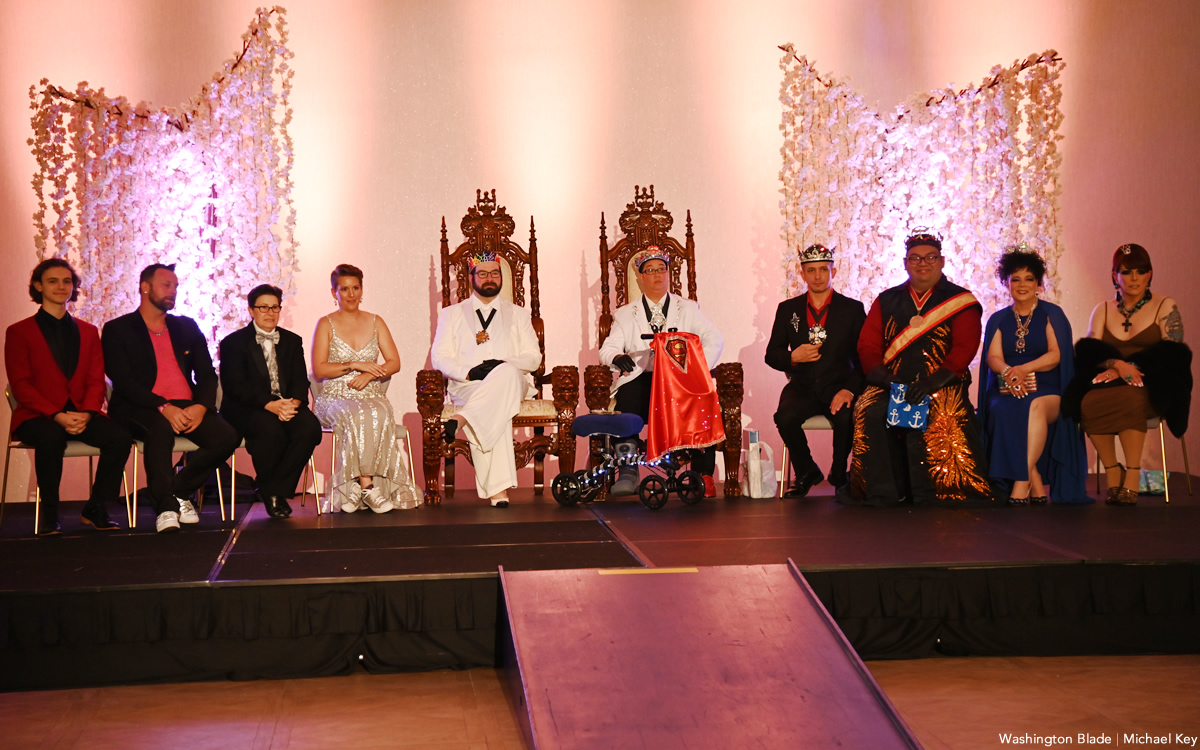
The Imperial Court of Washington, a D.C.-based organization of drag performers that has raised at least $250,000 or more for local LGBTQ and non-LGBTQ charitable groups since its founding in 2010, announced on Jan. 5 that it has ended its operations by dissolving its corporate status.
In a Jan. 5 statement posted on Facebook, Robert Amos, president of the group’s board of directors, said the board voted that day to formally dissolve the organization in accordance with its bylaws.
“This decision was made after careful consideration and was based on several factors, including ongoing challenges in adhering to the bylaws, maintaining compliance with 501(c)(3) requirements, continued lack of member interest and attendance, and a lack of community involvement and support as well,” Amos said in his statement.
He told the Washington Blade in a Jan. 6 telephone interview that the group was no longer in compliance with its bylaws, which require at least six board members, when the number of board members declined to just four. He noted that the lack of compliance with its bylaws also violated the requirements of its IRS status as a nonprofit, tax-exempt 501(c) (3) organization.
According to Amos, the inability to recruit additional board members came at a time when the organization was continuing to encounter a sharp drop in support from the community since the start of the COVID pandemic around 2020 and 2021.
Amos and longtime Imperial Court of Washington member and organizer Richard Legg, who uses the drag name Destiny B. Childs, said in the years since its founding, the group’s drag show fundraising events have often been attended by 150 or more people. They said the events have been held in LGBTQ bars, including Freddie’s Beach Bar in Arlington, as well as in other venues such as theaters and ballrooms.
Among the organizations receiving financial support from Imperial Court of Washington have been SMYAL, PFLAG, Whitman-Walker Health’s Walk to End HIV, Capital Pride Alliance, the DC LGBT Community Center, and the LGBTQ Fallen Heroes Fund. Other groups receiving support included Pets with Disabilities, the Epilepsy Foundation of Washington, and Grandma’s House.
The Imperial Court of Washington’s website, which was still online as of Jan. 6, says the D.C. group has been a proud member of the International Court System, which was founded in San Francisco in 1965 as a drag performance organization that evolved into a charitable fundraising operation with dozens of affiliated “Imperial Court” groups like the one in D.C.
Amos, who uses the drag name Veronica Blake, said he has heard that Imperial Court groups in other cities including Richmond and New York City, have experienced similar drops in support and attendance in the past year or two. He said the D.C. group’s events in the latter part of 2025 attracted 12 or fewer people, a development that has prevented it from sustaining its operations financially.
He said the membership, which helped support it financially through membership dues, has declined in recent years from close to 100 to its current membership of 21.
“There’s a lot of good we have done for the groups we supported, for the charities, and the gay community here,” Amos said. “It is just sad that we’ve had to do this, mainly because of the lack of interest and everything going on in the world and the national scene.”
Virginia
LGBTQ groups to join Spanberger inaugural parade
Virginia Pride among more than 25 orgs to march in Jan.17 event
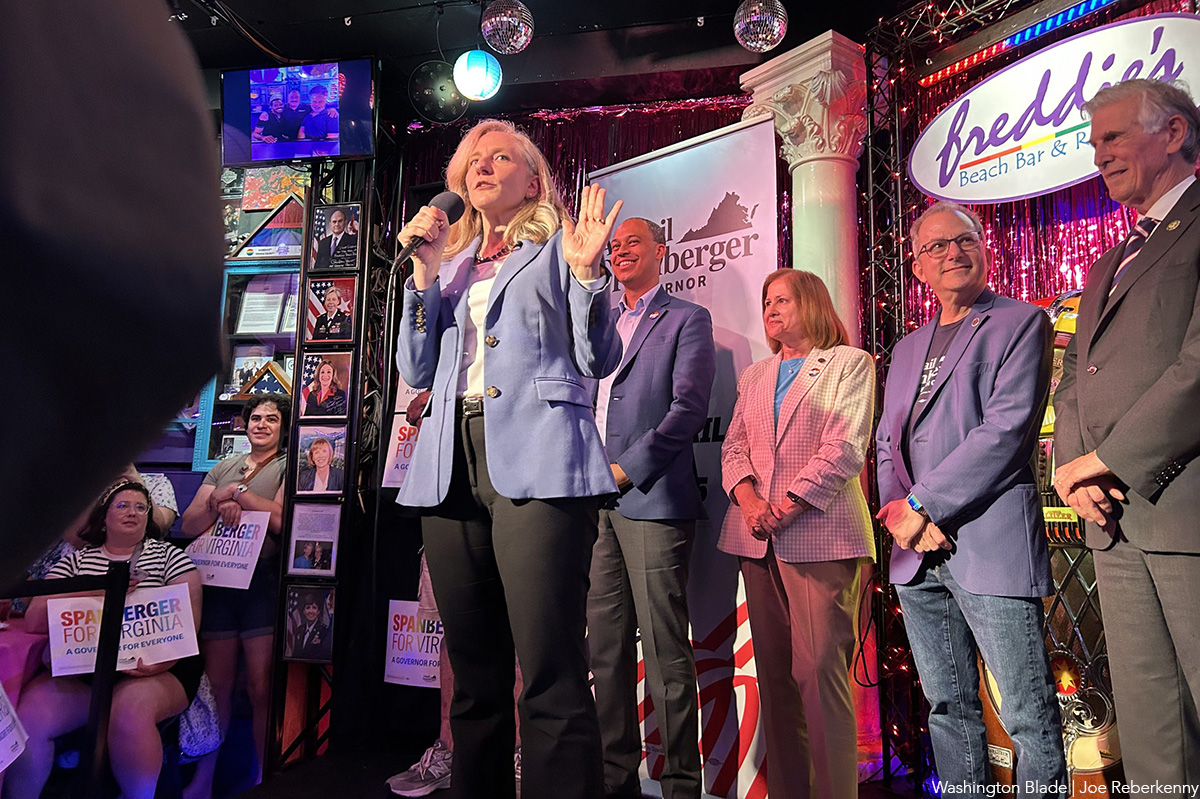
Virginia Gov.-Elect Abigail Spanberger’s inaugural committee announced on Jan. 2 that at least two LGBTQ organizations will be among more than 25 state-based organizations, including marching bands, that will participate in her inaugural parade on Jan. 17.
A statement released by the inaugural committee says the parade will take place immediately after Spanberger is sworn in as Virginia’s 75th governor and delivers her inaugural address in Richmond.
The statement lists the LGBTQ groups Virginia Pride and Diversity Richmond as two groups participating in the parade, although the two groups merged in 2021, with Virginia Pride becoming a project of Diversity Richmond. Among other things, Virginia Pride organizes Richmond’s annual LGBTQ Pride events.
“A display of the impressive talent and beauty of every corner of Virginia, our inaugural parade will be a celebration of all that makes our Commonwealth strong,” Spanberger said in the Jan. 2 statement. “I’m excited for attendees in the stands on Capitol Square and families watching together at home to see this incredible showing of Virginia pride,” she said.
James Millner, who serves as director of Virginia Pride, told the Washington Blade about 75 people are expected to join the Virginia Pride-Diversity Richmond contingent in the parade. He said among them will be members of other Virginia LGBTQ organizations.
“We’re going to invite our staff, our board, our volunteers, and our community partners to join us,” Millner said.
“We are thrilled and honored to have been invited to participate in Abigail Spanberger’s inauguration festivities,” he added. “I think this represents a marked change from the previous administration and demonstrates what she campaigned on – which is she sees the diversity of the Commonwealth as a strength that needs to be celebrated,” he said. “And we are very happy that she has invited us to represent the diversity of the commonwealth.”
Millner appeared to reflect on the sentiment of the large majority of Virginia’s LGBTQ community in its support for Democrat Spanberger over Republican Lt. Gov. Winsome Earle-Sears in the November 2025 Virginia election and the end of incumbent GOP Gov. Glenn Youngkin’s term in office on Jan. 17.
“After what we’ve been through with the Younkin administration, especially in its treatment of LGBTQ folks, especially transgender and nonconforming folks, I think we are all breathing easy and excited about what opportunities will exist in working with Abigail Spanberger,” he told the Blade.
District of Columbia
Two pioneering gay journalists to speak at Thursday event
Blade’s Chibbaro, Falls Church News-Press’s Benton talk long careers
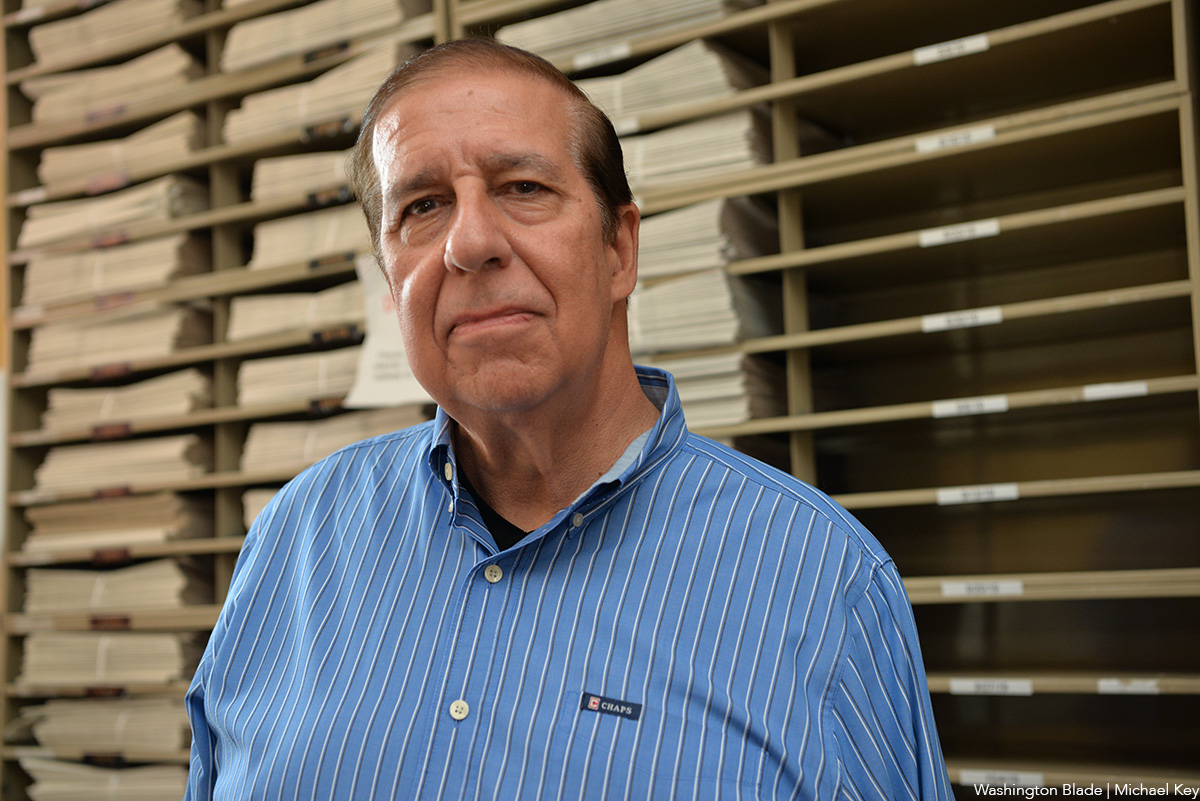
Two local gay journalists will speak on a panel this week about their long, pioneering careers.
A celebration of the Falls Church News-Press’s Nicholas Benton and the Washington Blade’s Lou Chibbaro Jr., two trailblazing LGBTQ journalists who have spent decades reporting on the front lines of social, cultural, legal, and political change in America, will be held this Thursday, Jan. 8, at the Women’s National Democratic Club of Washington. D.C., 1526 New Hampshire Avenue, N.W., at 6 p.m., according to a statement from organizers.
The program will explore their journeys, the evolution of LGBTQ journalism, and the ongoing fight for equality and justice. Benton and Chibbaro will also examine the various factors causing many news outlets to cease print publication and their energetic efforts to continue publishing their work both in print and online.
EVENT DETAILS:
- Remarks and Q&A, in-person and via Zoom.
- 6 p.m. complimentary hors d’oeuvres and cash bar; 6:30–7:30 p.m. program followed by book signing.
- Zoom only: $10. In-person: members: $20, nonmembers: $30 plus tax.
Benton’s latest book, “Please Don’t Eat Your Children, Cult Century, and Other Essays,” will be available for purchase at the event.
Benton is a longtime local journalist and LGBTQ rights activist whose work has had a lasting impact on both community journalism and social justice. Author of the first-ever editorial in the pioneering Gay Sunshine newspaper in 1970, he is best known as the founder, owner, and editor of the Falls Church News-Press, an independent weekly newspaper he launched in 1991 and is the paper of record for the City of Falls Church, Virginia.
Chibbaro is the senior news reporter for the Washington Blade and a pioneering journalist in LGBTQ news coverage. He has reported on the LGBTQ rights movement and community continuously since 1976, first as a freelance writer and later as a staff reporter, joining the Blade in 1984.



